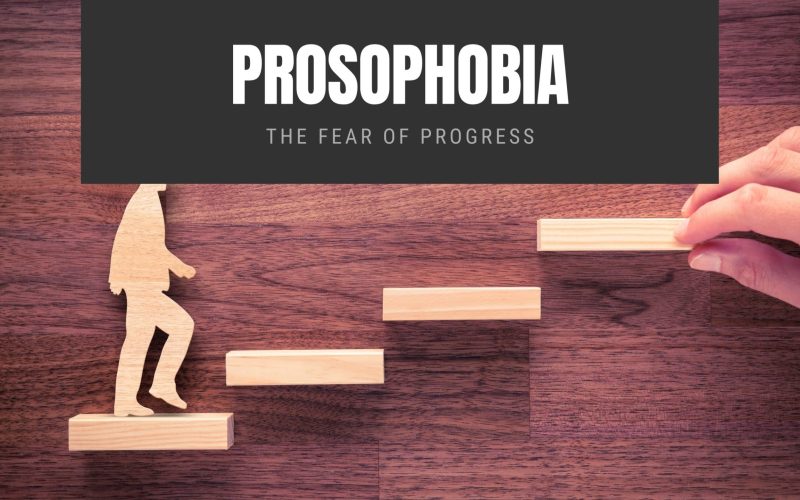Prosophobia is the apprehension of change that is unfounded. Someone suffering from this condition may find it extremely anxious to think about experiencing some improvement in their lives.
Such a belief is unfounded and out of contact with the truth. Prosophobia is much less related to the typical cynophobia (fear of dogs) and selachophobia (fear of sharks) phobias, and it is a much more irrational phobia such as eleutherophobia (fear of freedom).
Most people want advancement if it involves advancing in their profession, progressing in a relationship, or merely progressing as a human being.
However, some individuals see success as a path to more intrusive anxiety and more complex issues. Their inability to think about this problem coherently is a very major explanation of why they struggle with their degree.
Someone who has prosophobia could deliberately sabotage any chances they may have of actually advancing in a given field.
They can intentionally make mediocre attempts to preserve their lives’ status quo at the base level, but they can never reach the zenith of their true potential by doing so.
Although someone with prosophobia may experience less immediate distress when deciding to deliberately put less effort into things to reduce improvement due to their stagnancy, they may also suffer from low self-esteem and low trust.
This might sound like a paradox, but it is essential to note that people who have prosophobia generally don’t want to advance because of the fear they think is associated with it, not because they don’t actually want to develop themselves.
Symptoms of Prosophobia
Anxiety can be one of the most profound symptoms encountered in those living with prosophobia, as is the case with almost all phobias.
In fact, they can be so intrusive and extreme in their anxiety that they may even have a full-blown panic attack that may cause them to be hospitalized. Although this may not be the rule, it is still quite possible that this will happen.
As previously mentioned, someone with prosophobia can also suffer from low self-esteem. They may feel inadequate because of the sustained mediocrity in their lives.
In reality, they may want to advance in life, but they may not be able to take the steps required to do so, as they are also terrified of what unknown anxieties may manifest as a result of their progress.
They may also develop depressive symptoms due to their prosophobia, depending on their genetic makeup, as they may feel profoundly unfulfilled in their lives due to their deep fear of development.
Other signs of prosophobia can be seen below:
- Extreme anxiety when showing improvement
- Anxiety at the prospect of making progress
- They may intentionally make mediocre efforts
- Unable to deal with really intense feelings
- They can suffer from full-blown panic attacks
- Increased cardiac rate and shakiness
- Increased breathing and sweating rate
Causes of Prosophobia
Prosophobia is not an established cause. Nonetheless, genetics and one’s climate may play important roles in its development.
For example, someone with a family history of mental illness may have a higher risk of developing prosophobia because of the increased chance of having a genetic predisposition to develop mental illness.
If they were to have such a genetic predisposition, it might only take them to witness some form of a traumatic experience for them to develop full-blown prosophobia.
A traumatic experience that may lead to prosophobia being established by someone could be that they were raised in an atmosphere where they were frequently told that they were not good enough or “never amount to anything.” Such statements can have a major effect on a teenager’s mind, especially if that teen already has a genetic predisposition to develop mental illness.
While we can undoubtedly look at several possible reasons that may lead someone to develop prosophobia, it is not fully known the exact triggers of having an unreasonable fear of advancement.
This is also true for nearly all other phobias. However, specific phobias, such as the fear of dark or loud noises, can result from an evolutionary adaptation.
Be that as it may, while prosophobia is not the result of an evolutionary adaptation, it seems obvious that progression and creativity have enabled our species to prosper. So, to grow with a fear of change does not make sense to us.
This leads one to believe that biology and the climate are the most critical variables we can examine.
Treatments for Prosophobia
No treatment designed explicitly for prosophobia exists. Nevertheless, exposure therapy can be beneficial. Exposure therapy is one of the most effective and successful types of therapy to treat phobias.
However, it may not be for all, as this approach usually carries very high anxiety levels. So, an accomplished therapist needs to practice it to ensure the best outcomes.
Exposure therapy operates by making the therapist introduce the patient to what they fear over a given period.
In principle, the more they are exposed to their anxiety, the less they are bothered by it over time.
Someone who has prosophobia makes their therapist expose them to progress by putting effort into those tasks.
While such exercises would offer increased amounts of anxiety to the patient with prosophobia, the aim will be to feel less pressure gradually the more they are exposed to improvement.
It is also important that the patient is not too early to be subjected to too much change as their anxiety may be so severe that it may have an opposite impact on their exposure therapy.
If you think you might have prosophobia, or if you have any of the symptoms mentioned in this post, you should speak to your doctor as soon as possible so that you can be diagnosed and treated appropriately.
Other Treatments
Working Out for Prosophobia
Exercise is beneficial for people who suffer from anxiety disorders, including prosophobia. Cardiovascular exercise, in particular, can significantly help alleviate stress.
This is not to suggest that training for weight resistance does not help anyone with anxiety. Rather, aerobic exercise is more efficient in releasing certain chemicals, such as endorphins, that feel good in the brain.
According to the American Psychology Association, exercise can help condition the mind to cope better with stressful situations.
This makes sense when we consider the high amount of stress the body is under during strenuous exercise.
So if you are sedentary yourself, then participating in some aerobic exercise will help reduce your prosophobia symptoms dramatically by making it much easier for you to cope with the anxiety and stress associated with this disorder.
To help reduce the symptoms of prosophobia, you should engage in several different aerobic modalities, such as swimming, biking, skiing, walking, and jogging.
You can also reap the many advantages of exercise by playing tennis, soccer, basketball, and racquetball.
It may be possible to participate regularly in some form of exercise to help relieve some of the pain associated with prosophobia over time.
Yoga Sessions for Prosophobia
Different yoga poses can significantly help anyone with prosophobia. This is due to the meditative state of mind that yoga emits daily in those who practice it.
It is possible to think of yoga as meditation in motion. It may help alleviate some of the anxiety associated with prosophobia because participating in yoga can divert one’s mind to something more positive.
Someone with prosophobia will benefit from different forms of yoga, such as hatha yoga or hot yoga, among many others. Nevertheless, nearly all of them will help to reduce some of the tension and anxiety associated with prosophobia, regardless of the many types of yoga that exist.
If you have never practiced yoga before, then taking a class or watching guided videos that help you through each pose may be in your best interest.
The more you practice yoga, the more adept you will become at it, just like with meditation. You should also expect to achieve improved strength and endurance, which will help you reduce your prosophobia symptoms.
Mindfulness-based Stress Reduction (MBSR) for Prosophobia
MBSR is an 8-week evidence-based curriculum that provides secular, comprehensive mindfulness therapy to support people who are suffering from anxiety, stress, depression, and other kinds of mental distress.
MBSR may be able to help someone who is suffering from prosophobia dramatically, as mindfulness meditation is very effective for anxious people.
Someone with prosophobia should expect to acquire a plethora of specific skills in such a formal program that can help them alleviate the extreme fear associated with their particular phobia.
Speak to your doctor or therapist to see if MBSR can help minimize the severity of your prosophobia symptoms and the location of your area’s MBSR services.
Psychiatric Drugs for Prosophobia
Anti-anxiety Medications
These kinds of drugs are beneficial to help avoid panic attacks. Such medications can be helpful for people who have serious prosophobia since people with phobias frequently experience panic attacks as well.
Xanax, Valium, and Klonopin, among many others, are some popular anti-anxiety drugs.
Usually, these types of drugs are not taken regularly, but they may be insofar as their prosophobia is sufficiently severe. However, before you decide to do so, this is something that you should first address with your doctor to ensure that it is safe and successful.
Anti-depressant Medications
These types of drugs are not only for people suffering from depression, but they can also benefit people with anxiety disorders, such as prosophobia.
Paxil, Zoloft, and Lexapro, amongst many others, are some popular antidepressants. Some of the symptoms of prosophobia can be reduced by these drugs.
Usually, these types of medications are taken regularly. They can also help avoid the incidence of panic attacks, but they are most commonly used to help reduce the everyday anxiety of people.
Speak to your doctor and see if your symptoms of prosophobia can be minimized by taking antidepressants and whether or not it is safe to do so.
Cognitive Behavioral Therapy (CBT)
CBT is a psycho-social intervention aimed at improving one’s mental health. It is a tool that is commonly used to treat individuals with anxiety disorders such as generalized anxiety disorder and OCD.
Someone with prosophobia may also benefit from CBT as well as seeing how it would allow them to have a much better understanding of why they think and behave concerning their irrational fears in the way they do.
CBT can be beneficial for anyone with prosophobia, given the sheer automaticity of their symptoms.
For instance, when someone with prosophobia is exposed to their fear, they will almost always have an instantaneous subconscious reaction to their fear.
Such a lack of introspection may be a significant part of why anyone with this disorder will struggle to the degree they will.
CBT will help you step back and thoroughly examine your worries more than usual.
In addition to learning to be more fastidious about recognizing one’s particular fears, anyone with prosophobia that is engaged in CBT may also develop various other skills to help alleviate the distress induced by their disorder.
Dialectic Behavior Therapy (DBT)
DBT is a very successful care method for individuals dealing with emotion control. It is also used to treat people with borderline personality disorder.
However, it may also be rather advantageous for those suffering from anxiety disorders such as prosophobia.
This is due to the many coping abilities that you would expect to acquire in a DBT community. Usually, these groups last around six months and may have anywhere from two individuals to many individuals, depending on how many people enter the party.
Half-smiling is an instrumental DBT skill for those with prosophobia. This method makes you think about what you fear by softly smiling, slightly raising the corners of your mouth, hence the word “half-smiling.” But it is not enough to only think about your fear while half-smiling.
This is because you must also avoid entertaining certain painful emotions that might evoke your particular worry.
Mindfulness meditation is also used widely in DBT. It can significantly support those with prosophobia as it is performed in a social atmosphere that helps to get the patient out of their comfort zone.
Drinking hot tea to hone in on the sense of taste and tactile senses or simply concentrating on the breath can involve these community mindfulness practices.
Another beneficial DBT skill that can assist those with prosophobia is coping ahead. You would want to find a place to settle down peacefully without distraction by coping ahead.
Close your eyes and think of the potential situations you can face and resolve or cope with your fear.
If you are actually exposed to the specific fear associated with it in real life, doing so will allow you to be even more adept at dealing with your prosophobia.
Meditation for Prosophobia
Different ways of meditation exist that can be very useful for anyone who has prosophobia. Meditation on mindfulness is very effective in helping individuals to reach a more equanimous state.
There are different ways in which mindfulness meditation can be practiced, and there are also a lot of meditation apps designed to make it as simple for you as possible.
Mindfulness can benefit those who have prosophobia significantly because of how it can help them to distract themselves from their anxiety.
They do this by refocusing their attention on something else that does not have any emotional baggage attached to it, such as concentrating on the breath. Concentrating on the breath is one of the most fundamental ways to meditate and be present.
Redirecting one’s mind to the different sensations felt when breathing would potentially help minimize the amount of mental anguish encountered during such an influx of fear for those with prosophobia in the middle of a panic attack.
You can do it by paying careful attention to how the muscles in your abdomen and chest contract and relax with every inhale and exhale.
It would be best to reflect on how it feels with each inhale as your chest expands and how it sinks in with each exhale.
It would help if you also concentrated on the sounds around you, the way your skin feels when you touch certain things, the way foods taste, and the way certain aromas smell.
Essentially, honing your five senses will help you dramatically reduce some of the anxiety associated with prosophobia.
Also, note that being an adept meditator will take a lot of practice. So, practice is key.
Control Your Intake of Caffeine
It is no secret that consuming large quantities of caffeine can make you more nervous during the day. This makes sense when we consider how caffeine influences our body’s physiology.
When we consume a high dose of caffeine, our heart starts to beat more rapidly and become tenser. “In essence, our body will begin to go into a state of mind, “fight or flight. Such a state of mind is also a precursor for those with prosophobia to experience panic attacks.
Therefore, consuming little to no caffeine during the day will substantially help decrease your daily anxiety.
While doing so would certainly not make all of your distress go away, if you were to drink a significant amount of caffeine, it would also allow you to minimize any needless pain that you would have endured otherwise.
Beverages such as coffee, tea, and certain energy drinks are also high in caffeine. In fact, some foods, including dark chocolate, have caffeine in them. Being more aware of your daily consumption of caffeine can help you to reduce some of the prosophobia-related symptoms.





